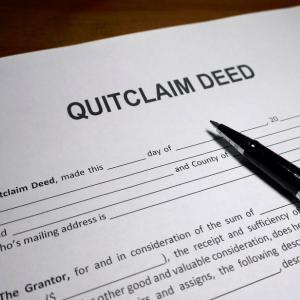
How to File a Quit Claim Deed in Oklahoma
What is a Quit Claim Deed?
A quitclaim deed is a legal document used in real estate law to transfer property rights. The grantor, who owns the property, gives up their interest to the grantee, the person receiving the property. Unlike warranty deeds, quitclaim deeds do not promise that the title is clear of any issues. Because of this, quitclaim deeds are often used among family members or individuals who trust each other.
Key Steps for Filing a Quit Claim Deed in Oklahoma
To file a quitclaim deed in Oklahoma, follow these steps:
- Prepare the Deed: Get a quitclaim deed form from an office supply store or online. Fill it out with details about the grantor, grantee, the legal description of the property, and the consideration, if any.
- Sign and Notarize the Document: Both the grantor and grantee must sign the deed, which needs to be notarized by a licensed notary public.
- File with the County Clerk: Submit the completed, notarized quitclaim deed to the county clerk’s office where the property is located and pay the filing fee, which may vary by county.
- Obtain a Certified Copy: Once the deed is recorded, ask for a certified copy from the county clerk’s office for your records.
These steps will help you complete the quitclaim deed process in Oklahoma.
Legal Requirements for Quit Claim Deeds in Oklahoma
For a quitclaim deed in Oklahoma:

- Legal Description: The deed must include the property’s exact legal description.
- Signatures: The grantor’s signature must be notarized.
- Recording: Record the deed with the county clerk to be legally effective.
- Consideration: Mention a consideration, even if small, to make the transfer legal.
These requirements ensure the quitclaim deed is valid under Oklahoma law.
Who Can File a Quit Claim Deed in Oklahoma?
In Oklahoma, anyone interested in a property can file a quitclaim deed. This includes:
- Grantors: The individuals transferring their interest in the property.
- Grantees: The recipients of the property interest who agree to the terms in the deed.
Both parties must agree on the transfer, making quitclaim deeds a practical option for real estate transfers in Oklahoma.
Understanding Oklahoma Property Deeds
Types of Property Deeds Available in Oklahoma
Oklahoma has different types of property deeds:
- Warranty Deeds: These guarantee a clear title and protect against future claims.
- Quitclaim Deeds: These transfer interest without warranties, often used with trusted parties.
Each type of deed is suitable for different situations.
Differences Between Quit Claim and Warranty Deeds
Key differences between quitclaim deeds and warranty deeds include:
- Title Assurance: Warranty deeds assure the title is clear, while quitclaim deeds do not.
- Use Cases: Use quitclaim deeds when parties know each other well; use warranty deeds for clear title assurance.
Knowing these differences helps you pick the right deed for your real estate needs.
Importance of Recording Deeds with the County Clerk
Recording deeds with the Oklahoma county clerk is important because:

- Legal Recognition: It ensures the transaction is legally recognized and enforceable.
- Public Record: Recording creates a public record, helping protect against future claims on the property.
- Title Transfer: It completes the process of property title transfer in Oklahoma.
Filing with the county clerk protects the interests of everyone involved.
When to Use a Quit Claim Deed in Property Transactions
A quitclaim deed is helpful in cases like:
- Family Transfers: Transferring property between family members.
- Divorce Settlements: Changing property ownership after a divorce.
- Clearing Title Defects: Fixing minor issues or errors with the title.
Under Oklahoma quitclaim laws, these transactions can be handled smoothly with a quitclaim deed.
Common Mistakes to Avoid When Filing a Quit Claim Deed in Oklahoma
When filing a quit claim deed in Oklahoma, avoid common mistakes. This helps ensure the legal transfer of property is clear and valid.
Incorrect Information on the Deed Form
A frequent mistake is having incorrect information on the deed form. Ensure all details about the grantor (the person transferring the property) and the grantee (the person receiving the property) are correct. This includes names, addresses, and property descriptions. If uncertain about any detail, seek legal advice to prevent problems during or after the transfer. Accuracy in property details ensures a smooth transaction.
Failure to Notarize the Document Properly
Notarization is crucial for the validity of a quit claim deed. A notary public must witness the signature on the deed to confirm it’s real. If not notarized correctly, the document may become invalid. Follow all notarization procedures, as the requirements are strict and may differ slightly by county.
Not Filing the Deed with the Appropriate County Office

After completing and notarizing the quit claim deed, it needs to be filed with the appropriate county office, usually the county clerk’s office, in the county where the property is located. Each county might have different filing rules, so check the correct location and filing process. In Oklahoma, not following proper real estate law can make the deed ineffective in transferring ownership.
Avoiding the Misuse of Quit Claim Deeds
Quit claim deeds can sometimes be misunderstood and misused. They mainly transfer ownership without assurances about the title’s status. This type of deed does not guarantee against claims on the property. Misusing quit claim deeds can result in legal issues, including disputes over property rights. Understand the legal implications before using this method of property transfer.
Costs Associated with Filing a Quit Claim Deed in Oklahoma
Knowing the costs of filing a quit claim deed in Oklahoma will help you budget for the property transfer. Costs can vary based on filing fees and the choice to get legal help.
Filing Fees and Other Charges
Filing fees are needed when submitting your quit claim deed to the county clerk’s office. These fees can vary between counties in Oklahoma, so check the specific charges in your area. Additional charges might include administrative fees or costs for extra copies of the deed. Being aware of these expenses in advance helps avoid surprises.
How to Estimate Costs for Legal Assistance
Legal assistance costs can vary depending on the complexity of the transaction and the lawyer’s expertise. Consulting with an Oklahoma real estate lawyer can clarify and assure the filing process. Most lawyers offer consultation services to help estimate costs before proceeding with full legal support. This step ensures you get the guidance needed while managing expenses.
Are There Any Hidden Costs When Filing a Quit Claim Deed?

Transparency in expenses is important when filing a quit claim deed. While most fees are transparent, unforeseen charges like extra paperwork or amendments can arise. To avoid unexpected expenses, get a detailed breakdown of all costs from legal advisors or county offices. Legal advice can help uncover these potential hidden costs.
Cost-Saving Tips for Filing Quit Claim Deeds
To save on costs when filing quit claim deeds, consider these tips:
- DIY Filing: If you’re confident in the process, filing the deed yourself can save on legal fees. But make sure you understand all legal requirements.
- Online Resources: Use available resources and guidelines from reputable sources to guide you through the filing process efficiently.
- Bulk Copies: Request additional copies of documents upfront rather than making multiple trips to the county clerk, as this can reduce transportation and handling fees.
Using these strategies, you can cut unnecessary expenses while ensuring an effective and lawful property transfer through a quit claim deed.
Exploring the Role of Grantors and Grantees
Knowing who the grantor and grantee are is key in real estate. These roles are important when dealing with documents like a quitclaim deed, which helps transfer property rights. This guide will explain what both parties do, focusing on real estate law in Oklahoma.
What is a Grantor in a Quit Claim Deed?
The grantor is the person or group that gives up its property rights using a quitclaim deed. This type of deed is often used when the property change isn’t a regular sale, like between family members. The grantor transfers their interest but doesn’t guarantee a clear title. It’s wise to carefully look at all legal documents involved in the property transfer.
Responsibilities of a Grantee in Oklahoma

The grantee is the one receiving the property rights. In Oklahoma, they need to make sure the title they get is valid. After getting a quitclaim deed, the grantee should check the property’s title history to avoid future ownership issues. This may mean doing a title search and getting title insurance for protection against claims.
How to Ensure Clear Title Transfer Between Parties
To make sure the title is clear when transferred, do the following:
- Do a Title Search: This confirms the grantor’s right to transfer the property and shows any liens.
- Use the Quitclaim Deed Correctly: Make sure it’s filled out right and signed by everyone required.
- Get Legal Advice: Talk to a real estate lawyer to clarify doubts and ensure everything follows Oklahoma laws.
- File with the County Clerk: Recording the quitclaim deed with the county clerk’s office makes the transfer official.
Understanding the Limitations of Rights Transferred
A quitclaim deed has limits on the rights it transfers. It doesn’t promise the title is clear, so the grantee only gets the interest the grantor had at the time. There’s a risk of unnoticed liens or claims. Knowing these limits helps both parties avoid legal problems under Oklahoma real estate law.
The Process of Notarizing a Quit Claim Deed in Oklahoma
Notarizing a quitclaim deed in Oklahoma is necessary to ensure it’s legal and authentic. Without notarization, the deed might not be legally binding, leading to issues in the property transfer process.
Why Notarization is Crucial for Quit Claim Deeds
Notarization confirms the signatures on a quitclaim deed. This step ensures that the people signing are who they say they are, reducing fraud. It also proves the deed’s execution in any property transfer, ensuring it follows Oklahoma law.
How to Find a Notary Public in Oklahoma
Finding a notary public in Oklahoma is easy:

- Local Banks or Credit Unions: Many offer notary services to account holders.
- Public Libraries: Some libraries provide notary services for free or a small fee.
- Online Directories: Use sites like Notary Rotary to find nearby notaries.
- Legal Services Providers: Real estate law firms often have notaries available.
Step-by-Step Guide to Getting Your Quit Claim Deed Notarized
Here’s how to notarize your quitclaim deed in Oklahoma:
- Prepare the Document: Make sure the quitclaim deed is ready for signing.
- Find a Notary: Choose a convenient notary service.
- Bring Identification: Both the grantor and grantee should have valid ID.
- Sign Before the Notary: Do not sign in advance; the notary must see you.
- Pay the Fee: Be ready to pay for the notary service.
What Happens After Notarization?
After notarization, file the quitclaim deed with the county clerk in the property’s county. This records the transfer officially and updates public records, allowing the new ownership to be legally recognized. In Oklahoma, filing the deed promptly helps prevent future property rights disputes.
Following these steps, those involved in a quitclaim deed transaction can experience a smooth, legal property transfer. For more help, consider consulting with Revive Real Estate, LLC, where experts can guide you through real estate transactions.
Navigating the County Clerk’s Office for Deed Filing
How to Determine the Correct County Office for Filing
When filing a quitclaim deed in Oklahoma, find the right county clerk’s office. The correct office depends on where your property is located. Start by checking the Oklahoma deed registry to confirm your property’s county. This step makes sure that your property title transfer is legally recognized. If you don’t know where to file a quitclaim deed in Oklahoma, check the county clerk’s website for help.
Required Documentation for Filing at the County Clerk’s Office

Before you go to the county clerk’s office, gather all the legal documents for your quitclaim deed filing in Oklahoma. You will need the quitclaim deed and any other documents required by Oklahoma property records. Look at the Oklahoma deed filing instructions to make sure your paperwork is correct and can be processed quickly.
Online Resources and Tools Offered by County Offices
Many Oklahoma county clerks provide online resources to help with deed filing. Their websites offer tools like downloadable quitclaim deed forms. These resources are valuable for understanding Oklahoma property law and following local rules. Before you visit the office, explore these online tools to make your filing experience easier.
Tips for Efficient Interactions with County Clerks
For smooth interactions with the county clerk, be ready and informed. Submit your quitclaim deed in Oklahoma with all the required documentation. To improve efficiency, follow the office’s advice on quitclaim deeds and stay polite. Contacting the Oklahoma deed office beforehand can also answer any questions about the process.
Assessing Risks and Benefits of Quit Claim Deeds
What Are the Risks Involved with Quit Claim Deeds?
Quit claim deeds are a simple way to transfer property but have risks. These include possible legal problems if the title is not clear or if there are existing judgments against the property. Know the limitations related to ownership claims that could void the quitclaim process in Oklahoma.
Benefits of Using Quit Claim Deeds in Real Estate Transfers
Despite their risks, quitting claim deeds offers benefits for real estate transfers in Oklahoma. They are cost-effective for quick property transfers and don’t require long title searches, which is useful for family transfers or trust creation.
How to Minimize Potential Legal Issues

To minimize legal issues with quit claim deeds, seek professional legal advice. Talk to a real estate lawyer to navigate Oklahoma quitclaim laws effectively. An attorney ensures that every part of the quitclaim deed is handled properly, reducing the chance of disputes.
Assessing If a Quit Claim Deed is the Right Choice for You
Deciding whether a quit claim deed is right for you needs careful thought. Look at the specific requirements for a quitclaim deed in Oklahoma compared to your estate planning goals or property ownership changes. Understanding the implications helps you make informed decisions based on your situation.
The Impact of Quit Claim Deeds on Estate Planning
Quitclaim deeds are often used in estate planning because they make property transfer quick and straightforward. However, it’s crucial to know the legal implications. Unlike warranty deeds, quitclaim deeds don’t guarantee a clear property title. This can greatly impact estate planning, especially when ensuring heirs and beneficiaries have property rights.
How Quit Claim Deeds Integrate into Estate Planning
Quitclaim deeds fit into estate planning when transferring real estate within a family. These deeds allow for transferring property interests without many legal hurdles. Like those in Oklahoma, being familiar with property laws is important to execute the deed correctly and align it with the estate plan.
Considerations for Using Quit Claim Deeds in Family Transfers
When using quitclaim deeds for family transfers, think about these factors:
- Property Ownership: Make sure the person giving the property owns it.
- Heirs and Beneficiaries: Understand how the transfer affects their ownership rights in the future.
- Real Estate Transactions: Be aware of any tax or financial consequences of the transfer.
Legal Implications for Heirs and Beneficiaries

Quitclaim deeds can significantly affect property rights for heirs and beneficiaries. They don’t ensure a clear title, which might lead to disputes if others claim the property. Discussing these issues with an experienced attorney can help avoid unexpected legal problems.
Professional Advice for Incorporating Quit Claim Deeds in Estate Plans
Getting advice from professionals who understand estate plans and quitclaim deeds is wise. Legal guidance ensures that the transfer matches the grantor’s wishes and follows property laws. Professionals can give specific advice to structure the transaction to benefit everyone involved.
Seeking Professional Guidance
Getting professional guidance is essential before you proceed with a property transfer using a quitclaim deed. Experts like real estate lawyers can provide valuable insights into property law and help you handle any potential legal issues.
When to Consult a Real Estate Lawyer
You should consult a real estate lawyer when:
- You plan to draft or execute a quitclaim deed.
- You face complex property law questions.
- You need clarification on how property transfers affect an estate plan.
How to Choose a Qualified Attorney in Oklahoma
To choose a qualified attorney in Oklahoma, you should:
- Check their expertise in real estate law.
- Look at client testimonials or past cases.
- Confirm their credentials and standing with the state bar.
Questions to Ask a Legal Advisor About Quit Claim Deeds
When talking to a legal advisor about quitclaim deeds, ask:

- What are the pros and cons of using a quitclaim deed?
- How will this change my current estate plan?
- Are there other methods of property transfer I should consider?
Additional Resources for Homeowners and Property Buyers
For homeowners and property buyers interested in quitclaim deeds and real estate transactions, you can explore:
- Legal guides and forms are available at local libraries or online.
- Community legal aid organizations offer educational workshops.
- Consultation services from real estate professionals and attorneys.
For thorough real estate guidance, consider choosing Revive Real Estate, LLC to meet all your property needs effectively and efficiently.
FAQs:
What is a Quitclaim Deed, and When is it Used?
A quitclaim deed is a legal document used to transfer property ownership. It doesn’t guarantee that the property has a clear title. People often use it between family members or to fix title issues.
How Do I File a Quitclaim Deed in Oklahoma?
Fill out the deed form with the correct property details to file a quitclaim deed in Oklahoma. Sign it before a notary public. Then, submit it to the county clerk’s office where the property is located, like Canadian County or Wagoner County, and pay any required fees.
Are There Differences in Filing a Quitclaim Deed in Other States?
Yes, each state may have its rules for filing a quitclaim deed. For example, Massachusetts, New Mexico, and Ohio might have different forms or steps. Always check your state’s laws or ask an expert.
What Fees Are Associated with Filing a Quitclaim Deed?
Fees can differ by county but usually include a recording fee at the county clerk’s office. You might also incur costs if you need professional help or legal advice.
Does Filing a Quitclaim Deed Affect Property Taxes?
Filing a quitclaim deed doesn’t directly change property taxes. However, when ownership changes, it might affect how taxes are calculated, especially if the fair market value changes. Check with your local assessor’s office to see how it could affect your tax assessment.
Can a Quitclaim Deed Be Used to Transfer Property with a Mortgage?
Yes, a quitclaim deed can transfer ownership, but it doesn’t change the mortgage. The original owner is still responsible for the mortgage debt unless it’s refinanced or settled differently.
What Should Be Included in a Quitclaim Deed Form?
Include the names of the grantor and grantee, a legal description of the property, and any needed disclaimers or notices. Make sure it’s notarized before you turn it in.
Can I Draft a Quitclaim Deed Myself?
You can draft a quitclaim deed using templates, but talking to a legal expert is smart. This ensures you meet all legal requirements and avoid disputes or mistakes that invalidate the transfer.
Key Insights
- Learn how to file a quitclaim deed in Oklahoma, especially in Canadian County, Wagoner County, Rogers County, Kay County, and Payne County.
- Explore the quitclaim deed process, focusing on requirements like statutory format, execution, and filing with the county clerk’s office.
- Understand important legal terms like warranty of title, warranty deed, and statutory provisions vital for filing a quit claim.
- Find out about necessary documents, including affidavit forms and PDF templates, to ensure you follow Oklahoma laws.
- Consider how factors such as coal mining, probate matters, and encumbrances can affect property transfers via a quit claim deed.
- Evaluate how mortgages, taxes, and debts might impact the validity and execution of a quitclaim deed.
- Gain insights into client relationships, including tenant agreements and eviction processes, that connect to property transfer through quit claim deeds.
- Use tools like PDF editors and online databases to fill out quitclaim forms efficiently and manage documents easily.
- Get expert advice for tricky situations in property transfers, such as when a grantor dies or terminates scenarios involving testamentary documents.
- Contact us for help navigating quit claim deed transactions, including any needed disclosures, to ensure accurate documentation.
This information is relevant to Oklahoma and its cities, including Oklahoma City, Tulsa, Enid, etc. For assistance or inquiries, please call (405) 669-6466 or visit our website at Revive Real Estate, LLC for more details.
Sell Your Oklahoma House A Matter Of Days…
Additional Resources For Oklahoma Sellers


